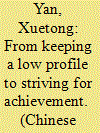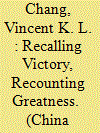| Srl | Item |
| 1 |
ID:
179302


|
|
|
|
|
| Summary/Abstract |
The material disparity with the West, and the havoc wreaked in the period of Japanese imperial encroachment on Chinese territory and autonomy after the First Opium War, have shaped and guided China’s collective memory and its shared desire of national rejuvenation to this day. In tracing the deeper historical roots of what Xi Jinping contemporarily frames as a “Chinese dream” of “wealth and power,” the article discerns key actors, events, and organizing principles in a long process toward restoring China’s deemed rightful place in the regional system. Taking into account the region-specific socio-historical complex of China and East Asia, and further exploring the parameters of an International Relations theory with “Chinese characteristics,” the article’s comparative historical analysis details how China’s leaders have chosen to mobilize the nation’s “domestic resources” in their common pursuit of national rejuvenation. Providing greater insight into how and according to which interlinked domestic and foreign explanatory markers this is attained, the article argues that we are currently in the last phase of rejuvenation and advances implications for China’s further trajectory.
|
|
|
|
|
|
|
|
|
|
|
|
|
|
|
|
| 2 |
ID:
131996


|
|
|
|
|
| Publication |
2014.
|
| Summary/Abstract |
Since 2012, some scholars, both Chinese and foreign, have argued that China's assertive foreign policy is doomed to fail. Nevertheless, after examining China's foreign relations in the last two years, this paper finds that China has experienced improved relations rather than deteriorating ones. In comparison with the strategy of keeping a low profile (KLP), the strategy of striving for achievement (SFA) shows more efficiency in shaping a favorable environment for China's national rejuvenation. The author applies the theory of moral realism to explaining the role of the SFA strategy and argues that morality can increase both international political strength and the political legitimacy of a rising power. The key difference between the KLP and the SFA is that the former focuses on economic gains and the latter seeks to strengthen political support. That is the reason that the SFA values the role of morality and the KLP does not. Due to these different goals, the SFA strategy differs from the KLP strategy in aspects of tenets, general layouts, working approaches, and methods. So far, the SFA has achieved progress beyond people's expectation from Xi Jinping in 2012. Xi's strong leadership may become a new case suitable for illustrating the theory of moral realism.
|
|
|
|
|
|
|
|
|
|
|
|
|
|
|
|
| 3 |
ID:
183240


|
|
|
|
|
| Summary/Abstract |
The recent surge in public remembrance of the Second World War in China has been substantially undergirded by a centrally planned and systematically implemented discursive shift which has remained overlooked in the literature. This study examines the revised official narrative by drawing on three cases from China's school curriculum, museums and formal diplomacy. It finds that the once dominant trope of “national victimization” no longer represents the main thrust in the Chinese Communist Party's (CCP) rhetoric on the Second World War. Under Xi Jinping, this has been replaced by a self-assertive and aspirational narrative of “national victory” and “national greatness,” designed to enhance Beijing's legitimacy and advance its domestic and foreign policy objectives. By emphasizing national unity and CCP–KMT cooperation, the new narrative offers an inclusive and unifying interpretation of China's war effort in which the victory in 1945 has come to rival the 1949 revolution as the critical turning point towards “national rejuvenation.” The increasingly Sino-centric and centrally controlled narrative holds implicit warnings to those challenging Beijing's claim to greatness.
|
|
|
|
|
|
|
|
|
|
|
|
|
|
|
|